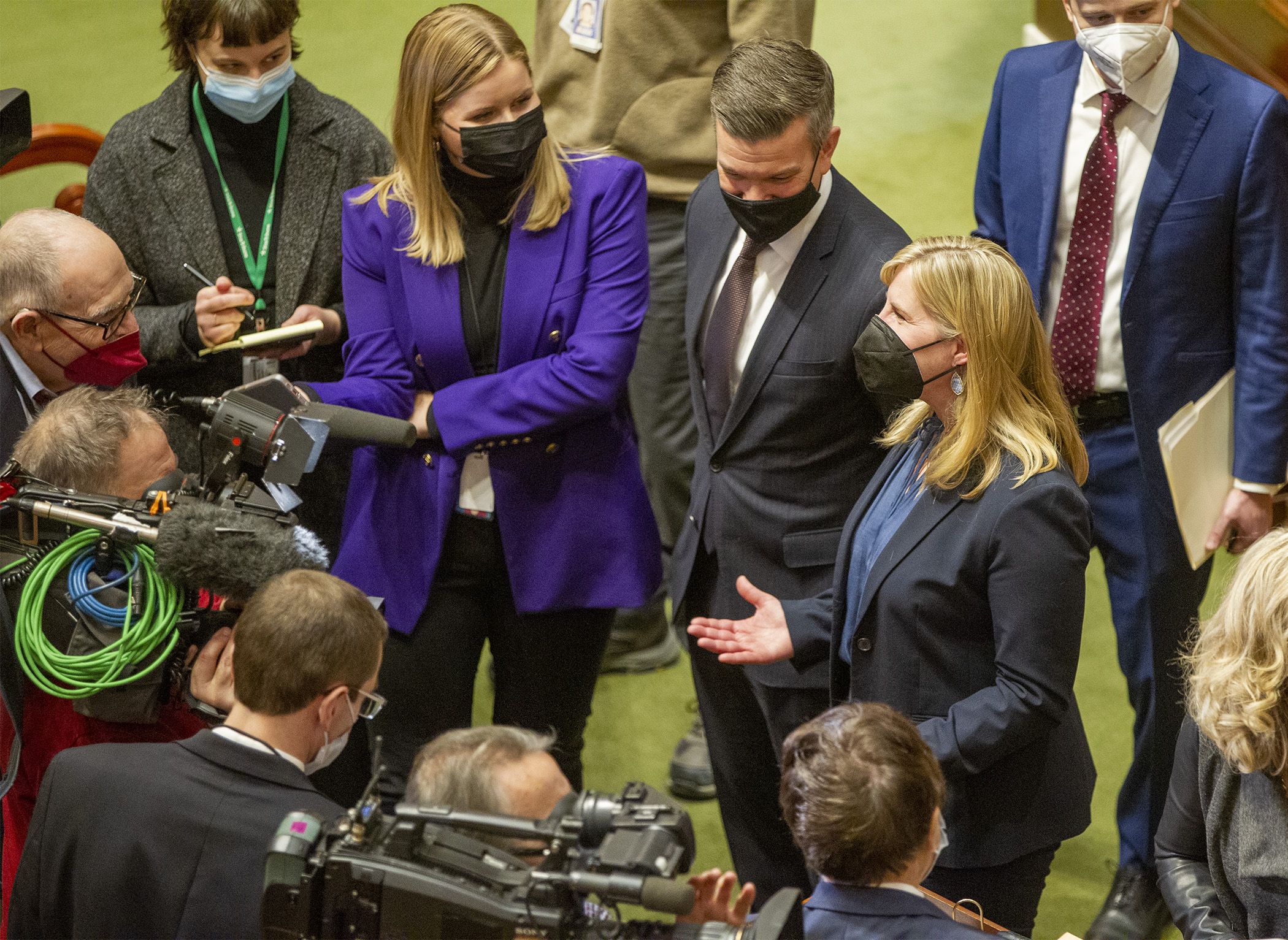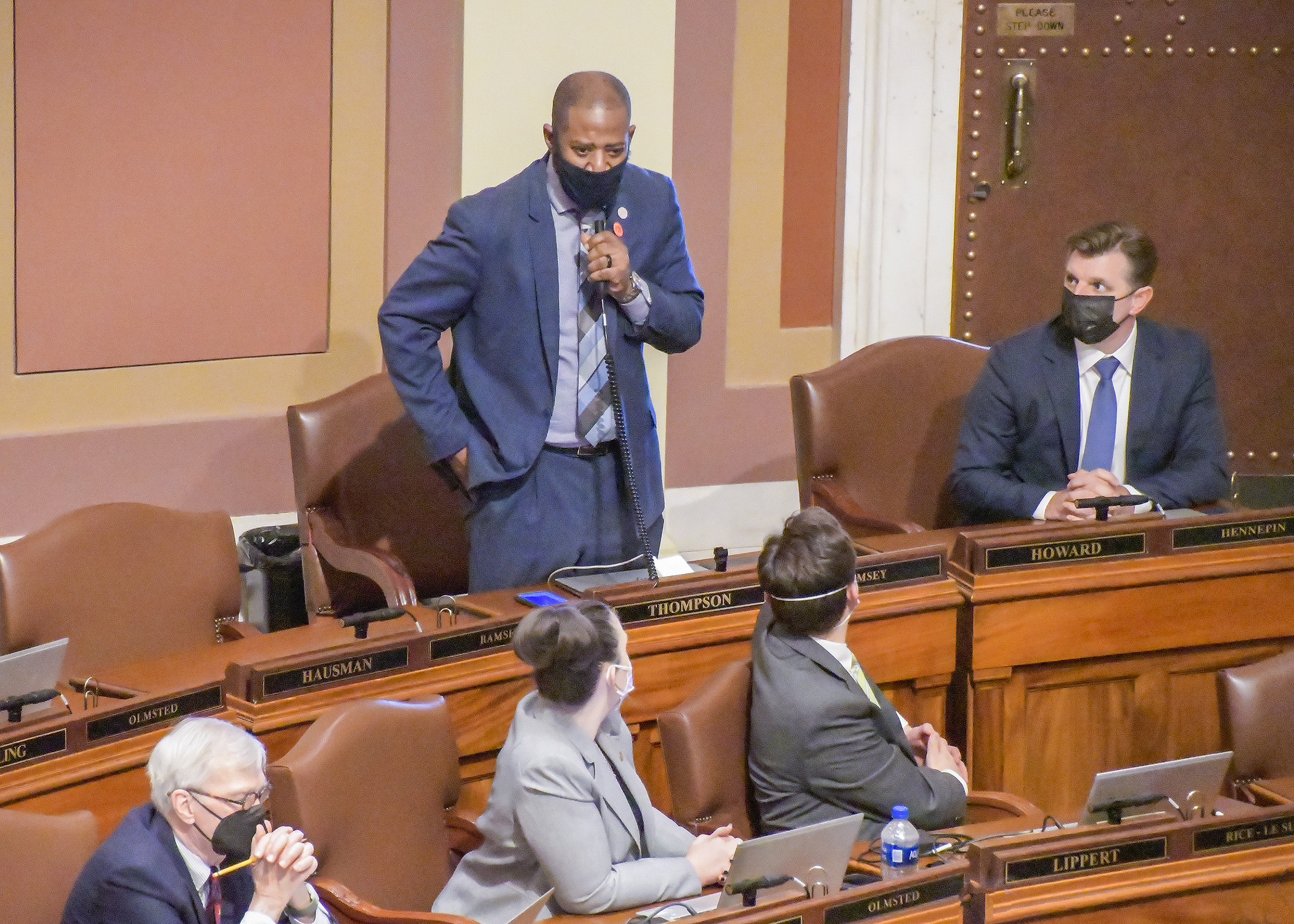As lawmakers reconvene, what shape will 2022 session take?

House members are masked up, Zooming and ready for action.
Not that any action is required of them. With the current biennium’s budget passed and signed into law last summer by Gov. Tim Walz, there’s no threat of a government shutdown. And, traditionally, even-numbered years are devoted to crafting a “bonding bill” to finance various projects around the state.
But in none of those even-numbered years has the Legislature been confronted with a projected surplus of $7.7 billion. So fresh funding may flow in any number of directions. That’s in addition to money from the federal government that has yet to be disbursed around the state.
At midday Monday, Minnesota’s House of Representatives was called to order for the first time in 2022 with about half of its members in the House Chamber and the others participating via video from various locales.
As the COVID-19 pandemic continues to produce a high rate of diagnoses and deaths in the state, House Speaker Melissa Hortman (DFL-Brooklyn Park) said last week that members and staff should expect to conduct business online this session, which constitutionally must end by May 23. There remains the possibility of some hybrid of virtual and in-person meetings during the session.
The House Rules Committee approved a policy Monday requiring masks to be worn by all House members, staff, the public, lobbyists or media in any House-controlled space. Virtual meeting platforms and electronic communications are strongly recommended.
As for Monday’s opening floor session, it lasted less than 45 minutes.
During it, Rep. John Thompson (I-St. Paul) issued an apology to Rep. Eric Lucero (R-St. Michael) for having called him a racist during a June 19, 2021 floor debate. Then members rose to honor seven former representatives who have died since the last session: Darby Nelson, Frank Moe, Jim Pehler, Sally Olsen, Joe O’Neill, Douglas Ewald and Norm DeBlieck.
 Rep. John Thompson makes a formal apology to colleagues on the House Floor Monday for comments he made in 2021. Photo by Andrew VonBank
Rep. John Thompson makes a formal apology to colleagues on the House Floor Monday for comments he made in 2021. Photo by Andrew VonBankWhile it’s not essential that the Legislature accomplish anything this session, it is an election year for all 201 legislative seats, as well as all constitutional officers. So having some results to tout while campaigning may serve members well.
Ah, but will they be talking to the same constituents as they did in 2020? Legislative maps will be redrawn this year as part of the redistricting process that takes place after each U.S. census. If the House and Senate don’t agree to a plan by Feb. 15, one put forth by a five-judge panel will rule.
That’s among the first orders of business, but other hot-button issues are expected to dominate the debate in coming weeks.
Bonding: How big a bill should there be when it comes to borrowing for capital projects around the state? Walz has proposed a $2.7 billion package, while House DFLers reportedly are aiming for something closer to $3.5 billion. Bringing home funding for local infrastructure projects could potentially burnish the resumes of those seeking re-election.
Education: The state’s students have clearly suffered during the pandemic, both personally and academically. Would a boost in education funding and increased programming help them recover?
Frontline worker pay: Who should qualify for the $250 million in federal money sent to the state as bonus pay for those forced to work non-virtually during the pandemic? And how much should they get?
Health care: Some House Republicans want to refinance the state’s reinsurance program, but there’s debate about how it would co-exist with expanded federal programs.
Housing: Should the state increase its stake in providing places to live as housing costs grow and options shrink?
Public safety: Should policy and funding focus more upon prevention or punishment? The quantity or quality of policing in the state? What’s been proven to work?
Reimbursing the feds: The federal government sent money the state’s way to shore up unemployment insurance funds, but that must be repaid or else state businesses may have to pay increased rates.
Taxes: With a large budget surplus, some sort of tax relief seems likely. But who should have their taxes cut and how much?
As for what to expect among proposals from House DFL members, House Majority Leader Ryan Winkler (DFL-Golden Valley) said in an interview last week with nonpartisan House Public Information Services, “We’re going to focus on the same things we’ve been focusing on throughout this pandemic. We need to make sure that families have basic economic security. That workers are being paid well and have access to paid leave. And we want to make sure that small businesses have the resources they need to come through this pandemic and be stronger on the other side.”
Speaking of the projected surplus, Rep. Dean Urdahl (R-Grove City), said in a statement, “By all rights, these dollars should be returned to taxpayers as much as possible and that’s what I will be advocating this session. Our state government has an overabundance of revenue and this is an unprecedented opportunity to provide long-term tax relief at a time people and businesses could use it most amid soaring inflation.”
Related Articles
Search Session Daily
Advanced Search OptionsPriority Dailies
Speaker Emerita Melissa Hortman, husband killed in attack
By HPIS Staff House Speaker Emerita Melissa Hortman (DFL-Brooklyn Park) and her husband, Mark, were fatally shot in their home early Saturday morning.
Gov. Tim Walz announced the news dur...
House Speaker Emerita Melissa Hortman (DFL-Brooklyn Park) and her husband, Mark, were fatally shot in their home early Saturday morning.
Gov. Tim Walz announced the news dur...
Lawmakers deliver budget bills to governor's desk in one-day special session
By Mike Cook About that talk of needing all 21 hours left in a legislative day to complete a special session?
House members were more than up to the challenge Monday. Beginning at 10 a.m...
About that talk of needing all 21 hours left in a legislative day to complete a special session?
House members were more than up to the challenge Monday. Beginning at 10 a.m...